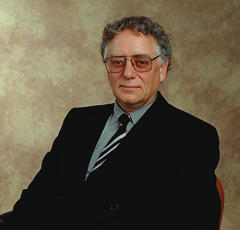CNI Spring 2009 Membership Meeting
April 6-7, 2009
Minneapolis, MN
Hyatt Regency Minneapolis
Opening Plenary Session
Monday — 1:15 p.m. to 2:30 p.m.
 |
David S.H. Rosenthal Chief Scientist |
How Are We Ensuring the Longevity of Digital Documents?
This address will explore sustainable approaches to format obsolescence in digital preservation. David Rosenthal, who is well known to the CNI community for his pioneering work in partnership with Vicky Reich on the LOCKSS (“Lots of Copies Keep Stuff Safe”) preservation system, has had a distinguished career as an engineer at Carnegie Mellon, Sun Microsystems, Nvidia, Vitria, and Stanford University. He will discuss some of the very deep thinking he has engaged in over the last few years about the interactions between the evolution of information technology over time and the social, technical, and economic factors that enable digital preservation, particularly at very large scale. He will look at changing fundamental understandings of threats and challenges in digital preservation starting from Jeff Rothenberg’s 1995 Scientific American article “Ensuring the Longevity of Digital Documents” and moving onwards to the present and the future, with emphasis on the emerging recognition that economic and social sustainability may well be the overarching long-term barrier. Rosenthal’s observations will likely change the way many in the field think about the digital preservation challenge.
Presentation Slides (PDF)
An extended version of this address is available at
blog.dshr.org/2009/04/spring-cni-plenary-remix.html
About David S.H. Rosenthal:
Dr. David Rosenthal is Chief Scientist of the LOCKSS Program at the Stanford University Libraries. There he was responsible for the concept and prototype of the LOCKSS system, for its “network appliance” technology, and for award-winning advances in fault and attack tolerance for peer-to-peer networks.
David is a long-time senior engineer in Silicon Valley, with a three-for-three record of working at successful early-stage startup companies. He joined Sun Microsystems in 1985 from the Andrew project at Carnegie-Mellon University, where he had worked on Window systems with James Gosling. In 1993 he became Chief Scientist and employee #4 at Nvidia, now the leading supplier of high-performance graphics chips for the PC industry, going on in 1996 to join Vitria Technology, now a leading supplier of e-business infrastructure technology. After initiating the LOCKSS program at Stanford with funding from the National Science Foundation, Rosenthal continued working on it at Sun Labs from 1999-2002. He has pursued the project at Stanford University since 2002.
David holds an MA degree from Trinity College, Cambridge and a PhD from Imperial College, London. He is the author of many technical publications and holds 23 patents.
Closing Plenary Session
Tuesday — 2:15 p.m. to 3:30 p.m

Patricia Cruse Director, Digital Preservation |
Initiatives from the National Science Foundation’s
DataNet Program
The Data Conservancy: A Digital Research and Curation Virtual Organization
Sayeed Choudhury
The Data Conservancy (DC) is one of two pending awards through the first round of the National Science Foundation’s DataNet program. DC embraces a shared vision: data curation is not an end, but rather a means to collect, organize, validate, and preserve data to address grand research challenges that face society. The overarching goal of DC is to support new forms of inquiry and learning to meet these challenges through the creation, implementation, and sustained management of an integrated and comprehensive data curation strategy. Through a well-defined management policy, DC will provide the foundation for a diverse, international team to iteratively develop, deploy, and evaluate infrastructure in a manner that combines rapid implementation with research, all with continual progress toward sustainability. A user-centered design methodology will be employed to guide the immediate development process, coupled with innovative longer-term information science research to fully understand data practices and curation across our initial disciplinary base of astronomy, biodiversity, earth sciences, and social sciences.
DataONE (Observation Network for Earth):
Envisioning a New Distributed Organization and Cyberinfrastructure to Enable Science
Patricia Cruse
In order to understand the nature and pace of change of life on Earth, nothing less than a new type of distributed organization is required to provide perpetual access to the data needed by scientists, decision-makers, and citizens. DataONE is proposing to develop this organization to meet the needs of science and society for open, robust, and secure access to well-described and easily discovered Earth observational data. The foundation of DataONE success is established partnerships among participating institutions that have multi-decade expertise in a wide range of fields: libraries, archives, environmental observing systems and research networks, data and information management, science synthesis centers, and professional societies. DataONE will address four key challenges: data loss, data dispersion, data deluge, and poor data practice. DataONE will enable the creation of new insights and knowledge through universal access to data concerning life on earth and the environment that sustains it.
Presentation (PPT)
About the speakers:
G. Sayeed Choudhury is the Associate Dean for Library Digital Programs and Hodson Director of the Digital Research and Curation Center at the Sheridan Libraries of Johns Hopkins University. He is also the Director of Operations for the Institute of Data Intensive Engineering and Science (IDIES) based at Johns Hopkins, in addition to serving as Lecturer in the Department of Computer Science at Johns Hopkins, Research Fellow at the Graduate School of Library and Information Science at the University of Illinois at Urbana-Champaign, and Senior Presidential Fellow with the Council on Library and Information Resources.
Patricia Cruse is the founding director of the California Digital Library’s (CDL) Digital Preservation Program. She works collaboratively with the ten University of California libraries to develop sustainable strategies for the preservation of digital content that support the research, teaching, and learning mission of the University. Ms. Cruse has developed and currently oversees several of CDL’s initiatives, including the NDIIP-funded Web Archiving Service and the IMLS-funded Digital Preservation Repository. Recent activities include specifying preservation services for the HathiTrust initiative and working with UC campus stakeholders to develop a set of digital curation micro-services. Ms. Cruse is a member of the DataONE Management Advisory Team.
